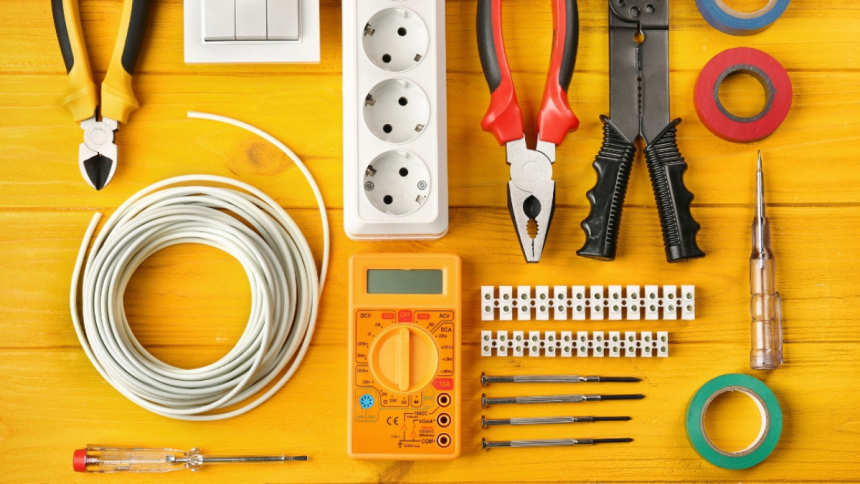Working with electricity requires precision, safety, and the right tools. Whether you’re a seasoned technician or just starting in the trade, having the proper equipment on hand can make all the difference between a smooth job and a frustrating—or even dangerous—experience. Electrical work isn’t just about skill; it’s also about preparation. The tools you carry in your bag reflect your readiness and professionalism.
Here’s a rundown of the top five must-have electrical tools that every technician should own. These tools not only ensure safety and efficiency but also help you maintain a consistent quality of work.
1. Multimeter
If you had to choose just one electrical tool to carry, it would probably be a multimeter. It’s the go-to device for measuring voltage, current, resistance, and continuity. When troubleshooting circuits or diagnosing issues in residential or commercial systems, a reliable multimeter is invaluable.
Look for one that’s digital and auto-ranging to save time when switching between different measurements. Advanced models also come with features like temperature sensors, frequency measurement, and data logging, which can be incredibly useful in fieldwork.
Having a multimeter allows you to work smarter, not harder. Instead of guessing whether a wire is live or why a circuit isn’t working, you can get accurate readings and make informed decisions.
2. Wire Strippers
It might seem like a simple tool, but wire strippers are essential for any technician. They allow you to cleanly and accurately remove insulation from wires without damaging the copper underneath. Precision is critical here—damaging the wire can lead to poor connections, which might cause issues down the line.
There are several types of wire strippers available. Some come with adjustable gauges for different wire sizes, while others are automatic and can strip wires with a simple squeeze. Choose one that feels comfortable in your hand and can handle a range of wire gauges.
Good wire strippers can save you time, reduce mistakes, and ensure that your electrical connections are safe and secure.
3. Clamp Meter
A clamp meter is a tool that combines the functionality of a multimeter with a current sensor. What makes it unique is its ability to measure current without the need to disconnect or cut wires. You simply clamp it around a conductor to get real-time current readings. This is especially useful when working in high-current environments or when diagnosing issues without disrupting the system.
For electricians who work with larger systems or industrial applications, a clamp meter is indispensable. It also offers a safer way to take readings, minimizing direct contact with live wires.
Some clamp meters even include features like voltage measurement, resistance, and inrush current detection, making them a versatile addition to your toolkit.
4. Screwdriver Set (Insulated)
You’ll find yourself reaching for a screwdriver more often than you think. That’s why it’s important to invest in a high-quality, insulated screwdriver set designed for electrical work. These screwdrivers are rated to withstand voltage and help protect you from accidental shocks.
Look for sets that include various head types like Phillips, flathead, Torx, and hex. A magnetic tip is also handy when working in tight spaces or when you’re dealing with small screws that can easily get lost.
An insulated screwdriver set not only improves safety but also gives you the confidence to work in live panels when necessary (although always follow lockout/tagout protocols).
5. Voltage Tester
A non-contact voltage tester is one of the simplest yet most important safety tools a technician can carry. It helps you quickly check if a wire or outlet is live without touching anything. Just bring the tester close to the wire or socket, and it will alert you—typically with a beep or light—if voltage is present.
This tool is great for a quick check before you begin any work, adding an extra layer of precaution. It’s especially helpful during service calls or when you’re dealing with unfamiliar systems.
Voltage testers are inexpensive but can save your life by preventing accidental shocks. Always use one before working on any circuit.
Honorable Mentions
There are, of course, many other tools that electricians may find useful depending on the specific nature of their work. Here are a few honorable mentions:
- Fish tape: Ideal for pulling wire through conduit.
- Cable cutters: Clean cuts help prevent fraying and ensure better connections.
- Labeling machine: Keeps your work organized and easily maintainable.
- Headlamp or work light: Because not every electrical box is well-lit.
Final Thoughts
Having the right tools doesn’t just make your job easier—it makes it safer and more efficient. Each tool on this list serves a specific purpose, from ensuring accurate diagnostics to preventing electrical accidents. While it may be tempting to cut corners or get by with subpar gear, investing in reliable, high-quality tools is a decision that always pays off in the long run.
So, before you head out to your next job, double-check your kit. Do you have these essentials? If not, consider making them a priority. Your work—and your safety—depends on it.
Lynn Martelli is an editor at Readability. She received her MFA in Creative Writing from Antioch University and has worked as an editor for over 10 years. Lynn has edited a wide variety of books, including fiction, non-fiction, memoirs, and more. In her free time, Lynn enjoys reading, writing, and spending time with her family and friends.















